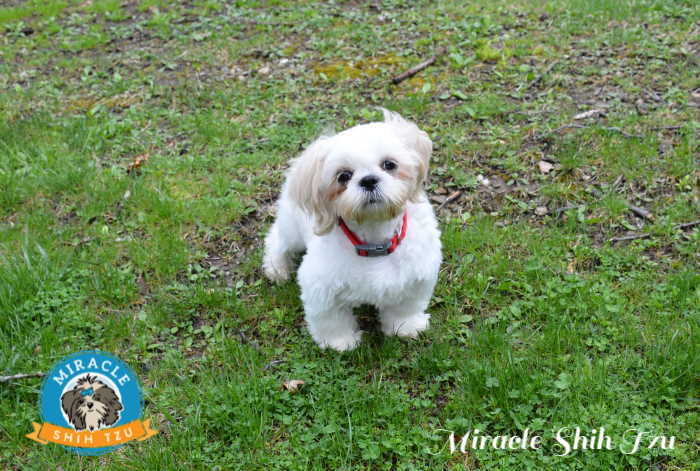- Home
- Problem Behaviors
- Shih Tzu With Depression
How to Help a Shih Tzu With Depression After Surgery
Shih Tzu with Depression By Paula Sieracka |Last Updated 07-26-2021
Recovery after surgery can be a stressful period for your dog. But thanks to your loving care, your dog should recover quickly. This article discusses some ways to help your dog get through the recovery period that can cause apathy and depression. You will find out if you can cope with your dog's mood yourself and when a specialist's help is needed. For more information regarding training, care, and feeding, please visit My Sweet Puppy website.

Can Dogs Get Depressed?
The dog is a very sensitive animal, empathetic, and capable of experiencing strong emotions. Whoever has a dog knows that they have better and worse days, and just like you, your dog can be sad, happy, scared, or angry. Similarly to people, it can react to adverse weather changes, empathize with your moods, and suffer from lack of interest. Therefore, it should not surprise us that with such a wide range of emotions, dogs experience deep sadness and, like us, suffer from diseases related to mood disorders.
How to Recognize a Shih Tzu with Depression

As a dog's owner, you need to recognize if it is apathy resulting from a temporary change of mood or a real depression.
Apathy is natural and arises from the need to rest after the operation. However, apathy can be a sign of emerging depression. So if it lasts more than two weeks, it's most likely depression, and we should take action.
Depression is defined as a disorder characterized by various symptoms that occur in the form of mood changes, falling into sadness, anxiety, and psychomotor disorders.
Going through surgery can be a significant cause of canine depression. Operations are factors affecting animals, which can cause imbalances, homeostasis disorders, lack of fulfillment, and satisfaction. Often, the dog after surgery is forced to wear a cone that keeps them from scratching their stitches. It significantly limits your dog's mobility and prevents it from playing as usual, which can lead to a decrease in mood.
You are Your Dog's First and the Most Important Psychologist
 Helping Your Shih Tzu with Depression: You are His First Psychologist
Helping Your Shih Tzu with Depression: You are His First PsychologistTaking a dog for long walks is one of the most effective tools in fighting a dog's depression. Let's try to make the walks varied. Break the routine as often as possible and change your routes. Let your furry friend make contact with other dogs on walks.
Try to keep those contacts safe and under control. You can encourage your dog to be active with his favorite treats. It may be a good idea to try how your dog is doing in dog sports (e.g., agility). Perhaps this will turn out to be an ideal way of spending time together, thanks to which the dog will find satisfaction with life.
Don't Let Your Dog Eat Bigger Portions When the Depression Occurs
We humans often eat a lot when we are worried. On bad days we console ourselves with a bar of chocolate or an additional portion of dinner. Do not transfer these adverse health habits to the dog - you can accidentally fatten it. If your pet is sad and you give him a treat, he probably takes it as a reward for apathetic behavior. It is a signal for him that this is OK, and you do not want him to be depressed, but a joyful, energetic pooch.
A Dog Behaviorist's Experience is Always Helpful
A dog behaviorist can help us treat canine depression. An expert will analyze the dog's lifestyle, take a look at the relationship you and your family have with the dog, and propose specific actions to help your pet become happy and energetic again. In many cases, the success of the therapy is in the hands of the pet's owner.
You must devote more time to the dog and provide it with the right amount of positive experiences, stimuli, attractions, and a lot of love. In challenging cases, behavioral consultations may not be enough.
Veterinarian Assistance and Pharmacological Treatment
If your and your dog's behaviorist's efforts are not working, this is an excellent time to go to a vet. It would be best to ask for help from a veterinarian who will include pharmacological treatment in the therapy. Psychoactive treatment in quadrupeds is becoming increasingly popular. Medications for psychiatry that work on people also work on animals.
That is why psychotropic drugs for animals, although they have different names, are chemically identical to those intended for us. Tablet treatment lasts a minimum of six months and - unfortunately - puts a strain on the liver, which is why medications should be the last resort.
Summary of Shih Tzu With Depression
Let us show our dogs more tenderness and time if we see signs of postoperative depression in them. Let's play with them and spend a lot of time on walks. Let's remember that the pooch can't deal with the problems alone and that our presence is the best medicine. Dogs are expecting the same that we humans are during difficult and sad times - friends and family. Let's be there for them.
Shih Tzu with Depression: Pin for Future Reference
Author Bio
Paula Sieracka is a passionate and experienced content writer. She graduated in Journalism to turn her passion into a profession. She is an owner of two big dogs and a shelter cat. As an owner, she constantly delves into the secrets of animal behaviorism.
"Hi, I'm Janice Jones, a former veterinary technician and Shih Tzu expert with over 40 years of experience with the breed. Through Miracle Shih Tzu, I combine my medical background and extensive breed knowledge to provide reliable, practical advice for Shih Tzu owners. My mission is to help you give your Shih Tzu the happiest, healthiest life possible through evidence-based information and real-world solutions. Whether you're new to the breed or a seasoned owner, you'll find trusted guidance here for all aspects of Shih Tzu care.
I hold an undergraduate degree in Psychology with a minor in biology, Early Childhood Education, and Nursing, and a Master's in Mental Health Counseling.







